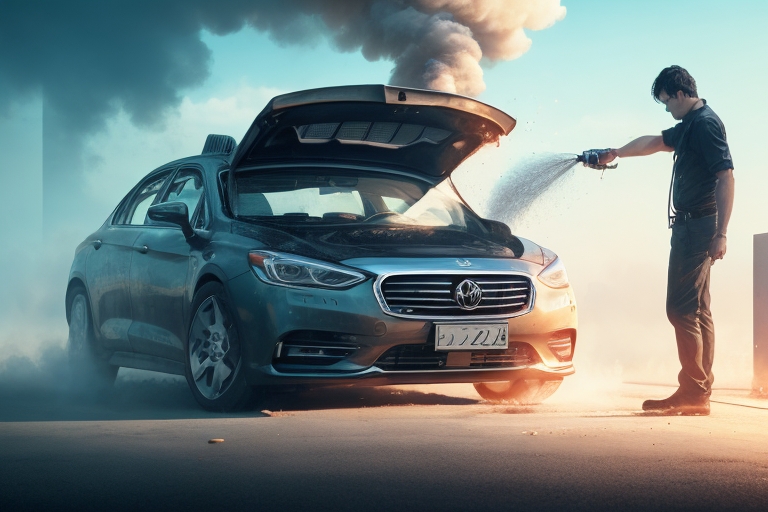On a scorching summer day or during long, uphill drives, the last thing any driver wants to experience is a car overheating. It’s a situation that can quickly turn your journey into a disaster if not handled correctly. Car overheating isn’t just an inconvenience; it can cause severe engine damage and leave you stranded on the side of the road. In this article, we’ll explore the causes of car overheating and, more importantly, what you can do to prevent this potentially catastrophic scenario. Whether you’re planning a road trip or simply want to ensure your daily commute remains trouble-free, understanding how to keep your car’s temperature in check is vital for every driver.
The Importance of Regular Maintenance
You should prioritize regular maintenance to ensure your car’s cooling system is functioning properly and prevent the risk of engine overheating.
Regular maintenance includes:
- Checking and replacing coolant levels
- Inspecting hoses and clamps for any signs of wear or leaks
- Ensuring the radiator is clean and free of debris
It’s also important to:
- Regularly check the thermostat and replace it if necessary
By keeping up with these maintenance tasks, you can:
- Identify any potential issues before they become major problems
Neglecting regular maintenance can lead to:
- A buildup of dirt and debris in the cooling system
- Clogs and reduced system efficiency
This can ultimately result in:
- Engine overheating
- Expensive repairs and potential engine damage
Taking the time to prioritize regular maintenance will help:
- Keep your car running smoothly
- Avoid the risk of engine overheating.

Identifying and Addressing Cooling System Leaks
When addressing cooling system leaks, be sure to thoroughly inspect all hoses and connections for signs of leaks, and promptly address any issues to prevent further damage.
Leaks in the cooling system can lead to engine overheating and potential engine damage if left unattended. Start by visually examining all the hoses and connections, checking for any signs of coolant leakage such as puddles or wet spots. Pay close attention to the radiator, water pump, and thermostat housing.
If you notice any leaks or signs of damage, it’s important to take immediate action. Replace any damaged hoses or connections and ensure they’re properly tightened.
Additionally, check the coolant level and concentration regularly to prevent overheating. Taking these precautions will help keep your cooling system in good condition and prevent costly repairs down the line.
Ensuring Proper Coolant Concentration
To ensure optimal performance, regularly monitor your car’s coolant concentration and use the appropriate coolant mixture. This is important because the right coolant concentration helps in maintaining the temperature of your car’s engine and prevents it from overheating.
Reasons for Engine Overheating:
- Leakage in the cooling system
- Inadequate coolant concentration
- Loose hose clamp of the coolant
- Broken thermostat
- Clogs or cracks in the radiator
Steps to Take When Your Car Overheats:
- Switch on the heater
- Switch off AC
- Park car safely and pull over
- Open the bonnet of your car
- Monitor the thermometer
Maintaining a Functional Thermostat
In order to maintain a functional thermostat, regularly clean and inspect it for any signs of damage or malfunction. Your thermostat plays a crucial role in regulating the temperature of your home or office, so it’s important to keep it in good working condition.
Start by turning off the power to the thermostat and removing the cover. Use a soft brush or cloth to gently clean any dust or debris that may have accumulated on the inside. Check the wiring for any loose connections or frayed wires, and tighten or replace them if necessary.
Preventing Radiator Clogs and Cracks
Ensure that you regularly flush and inspect your radiator, for it prevents clogs and cracks from occurring. Taking care of your radiator is essential for maintaining the overall health of your car’s cooling system. By following these steps, you can prevent potential disasters and costly repairs:
- Flushing and Inspecting the Radiator:
- Drain the coolant from the radiator and flush it with water to remove any debris or sediment.
- Inspect the radiator for any signs of clogs or cracks and repair or replace it if necessary.
- Maintaining the Cooling System:
- Check the coolant levels regularly and top up if needed.
- Replace the coolant according to the manufacturer’s recommendations.
By taking these simple precautions, you can ensure that your radiator remains in good condition and avoid any issues that may lead to overheating or engine damage.
Stay proactive and keep your car running smoothly.
Conclusion
In conclusion, by following these vital steps to prevent car overheating, you can ensure the smooth running of your engine and avoid any costly repairs.
Regular maintenance, addressing cooling system leaks, maintaining proper coolant concentration, and preventing radiator clogs are all essential in keeping your car’s temperature under control.
Don’t let overheating become a nightmare scenario on the road – take control and prevent disaster with these simple yet effective measures.

COMMENTS